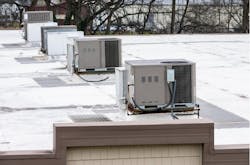DOE: New Cold-Climate Heat Pumps Ready to Market
PRESS RELEASE
Washington DC, October 23, 2024 -- The U.S Dept. of Energy (DOE) announced today that all eight manufacturers in the Residential Cold Climate Heat Pump Challenge completed rigorous product field testing to demonstrate energy efficiency and improved performance in cold weather. Cold climate heat pumps (CCHPs) developed as part of the challenge will enter commercial production as soon as this fall, manufacturers say.
Building upon the success of the residential challenge, DOE is now working with nine heat pump manufacturers to advance rooftop units (RTUs) for commercial buildings through a new technology challenge. This initiative is part of the Commercial Building Heat Pump Accelerator, in which DOE is working across the supply chain for commercial heating, ventilation, and air conditioning systems to advance the adoption of heat pump RTUs.
- Bosch, Carrier, Daikin, Johnson Controls, Lennox, Midea, Rheem, and Trane Technologies all participated in the challenge.
Heating and cooling buildings account for 40% of U.S. greenhouse gas emissions. Next-generation CCHPs are a vital clean energy technology that can potentially reduce household utility bills while also slashing harmful carbon emissions. For commercial buildings, heat pump RTUs are estimated to reduce greenhouse emissions and energy costs by up to 50% compared with conventional RTUs fueled by natural gas. But while overall demand is growing, adoption has lagged in cooler climates because of reduced performance in cold weather.
“The residential challenge and commercial accelerator bring together public and private sector stakeholders to address technical challenges for improving heat pump performance in cold climates and barriers to market adoption,” said Hayes Jones, acting director of DOE’s Building Technologies Office, which developed and supports the initiatives. “DOE’s support for industry advancements will help get cost-effective clean energy technology into homes, offices, schools, and other facilities.”
The technology advancements fostered by the Residential CCHP Challenge and Commercial Building Heat Pump Accelerator will help the United States meet the Biden-Harris Administration’s goal of 100% carbon-pollution free electricity by 2035 and a net-zero carbon economy by 2050.
They will also advance DOE’s buildings decarbonization blueprint objectives to reduce greenhouse gas emissions from U.S. buildings 65% by 2035 and 90% by 2050. And they will help reach Affordable Home Energy Shot goals to reduce the upfront cost of upgrading a home by at least 50% while reducing energy bills by 20% within a decade.
Residential Cold Climate Heat Pump Challenge Success
Established in 2021, the Residential CCHP Challenge aimed to develop, test, and commercialize heat pumps that could deliver as much heat as needed without using auxiliary heating elements. These CCHPs would be capable of operating at 5°F (–15°C) or lower with energy performance well beyond current best-in-class products.
Bosch, Carrier, Daikin, Johnson Controls, Lennox, Midea, Rheem, and Trane Technologies all participated in the challenge.
They successfully completed prototype testing at Oak Ridge National Laboratory and other facilities in 2022 and 2023, with some units operating at temperatures as low as –15°F (–26°C) while still meeting efficiency requirements. The companies then moved products into field testing in 23 residential sites located across 10 U.S. states and 2 Canadian provinces. In partnership with Pacific Northwest National Laboratory, each site gathered a full year of data. U.S. testing sites were in the Northeast, Midwest, and Mountain regions.
In the field, the residential CCHPs reliably provided heat with little assistance from auxiliary elements, even during the coldest winter periods. The real-world field testing in customer homes, along with customer feedback and independent third-party performance evaluation, provided valuable information that enabled the manufacturers to optimize their products prior to commercialization.
DOE has published key findings from the field testing, providing manufacturers as well as state and utility partners with the knowledge and experience to commercialize, deploy, and incentivize CCHP products.
“Electrification without improved heat pump technology will put a strain on the grid as the current technology struggles to maintain its efficiency ratings in low temperatures,” said Zoe Eckert, sustainable energy program and policy senior manager at the Massachusetts Municipal Wholesale Electric Company. “The CCHP challenge is bringing manufacturers and stakeholders together to solve a very real issue, upholding the very definition of innovation and collaboration that the energy industry needs to improve our reliability.”
Next Up: Commercial Building Heat Pump Accelerator
Through Better Buildings, DOE is now working with heat pump manufacturers AAON, Addison, Carrier, Daikin, Johnson Controls, Lennox, LG, Rheem, and Trane Technologies to improve the energy efficiency and performance of RTUs in cold weather. The manufacturers will partner with DOE and national laboratories to create prototypes and test product performance and durability. They will then lead field validations with Better Buildings partners, including Amazon, General Motors, Ikea, the Los Angeles Unified School District, Target, Whole Foods, and others.
Slated to run through December 2027, the accelerator includes the technology development challenge and a targeted campaign to promote product adoption. Through the campaign, DOE will provide building owners and operators with resources and guidance to deploy heat pump technology to support installations at individual sites and across a portfolio of buildings. Other resources include emissions estimates and economic comparisons for different geographic regions, plus case studies showcasing how building owners have successfully implemented heat pump RTUs to achieve decarbonization goals.
Learn more about the Residential Cold Climate Heat Pump Challenge and Commercial Building Heat Pump Accelerator. DOE’s Building Technologies Office has also developed a residential Cold Climate Heat Pump Decision Tool to assist residential contractors and installers in selecting and properly installing the appropriate unit for each home.
